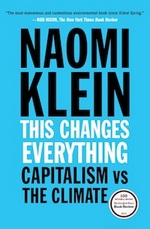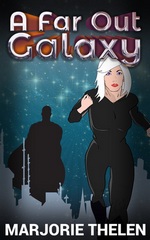Marjorie Thelen, an author I talked about last month asked if I’d be interested in guest reviews, and sent this one along — which is great, because I’ve just been too busy this week to come up with a post for today. Hope you enjoy it — and be sure to stop by her page and look at her books, would you? Thanks, Marjorie!
Oh yeah, probably obvious, but the opinions expressed in this post are all Marjorie’s, and do not necessarily reflect mine.
—
 This Changes Everything: Capitalism vs. The Climate
This Changes Everything: Capitalism vs. The Climate
by Naomi Klein
Paperback, 532 pg.
Simon & Schuster, 2015

If you think you are not responsible for combatting global warming, think again. You better read this book. It has “radicalized” me into becoming an environmental activist.
With notes and acknowledgements this book is 532 pages (paperback) and jammed packed with information, facts, and opinion. Naomi Klein makes the compelling case that unfettered capitalism as a way of life is destroying the environment and is a big contributor to global warming. The faster we-the-people regulate large corporations, particularly the extractive industries like oil and mining, the better chance we have of reversing climate change. She outlines case after case after case of the harm the oil industry has done to the environment. Extreme extraction like fracking is especially harmful to land, water, and people. If you haven’t heard of the earthquakes in Oklahoma caused by fracking, you are living in a vacuum.
Our church book study group read the book, it is on the recommended reading list for the Episcopal Diocese of Eastern Oregon, and it has top reviews from a number of organizations and individuals. I had to make a tremendous effort to read the book, because in the first two sections, Klein paints a pretty dismal picture. Her writing is dense with fact and opinion. She is often repetitive but she gets her points across with facts. In part one she outlines how free market fundamentalism helped overheat the planet in a chapter by that name. She gives extensive coverage to the climate deniers, to scientists who think creating clouds will cool the planet, to the environmental groups she calls Big Green, some of whom, as it turns out, are in bed with Big Oil. In chapter seven she tells us that there are no messiahs, that the green billionaires won’t save us. She beats up on Richard Branson, the airline magnate, at length and points out that even though he talks a good green game, he and other green billionaires don’t follow through on their promises.
Klein gets more hopeful in part three with the chapter on the new climate warriors, who are ordinary citizens blockading the advance of the extractive industries. She sees hope in the Blockadia movement and gives examples of the development of the movement, like the protest to stop the Keystone XL pipeline. She says that extraction and refining has always required sacrifice zones and usually it is the underrepresented and poor who pay the price. “Through various feats of denialism and racism, it was possible for privileged people in North America and Europe to mentally cordon off these unlucky places as hinterlands, wastelands, nowheres . . . . the people reaping the bulk of the benefits of extractivism pretend not to see the costs of that comfort so long as the sacrifice zones are kept safely out of view.” (p. 311) Throughout the book she does not mince words.
She applauds the effort of Indigenous peoples to prevent tar sand development, open pit mines, fracking, and pipelines from destroying their lands and livelihoods. White people are glad to see this push back from the Indigenous people, but they can’t think that Indigenous people can carry on the fight by themselves. Everyone has to join in. Ironically, we now need the Indigenous on “our” side, whereas their concerns and battles were invisible to us before.
Klein advocates much more regulation of the extractive industries, read here Big Oil, Big Coal, Big Copper, think the development of the Pebble Mine in Briscoe Bay in Alaska. I don’t see that in today’s political climate more government regulation is in the cards, but I’d be happy if someone proves me wrong.
And when we keep oil in the ground we affect the love affair that American have with their trucks and SUVs. When are we going to stop buying them and go to more fuel-efficient vehicles? It would also affect plastics and related industries. When will the American consumer stop buying products that are not environmentally friendly? The consumer price index is a huge indicator of the health of our economy and what happens if and when Americans stop consuming so much? There are far-reaching implications of what Klein proposes in combatting global warming, and time is of the essence.
The divestment movement is another way to combat contributors to climate change. Institutions, colleges, organizations can divest in the stock of these companies that they hold. This is making headlines now. International laws and moratoriums can prevent and rollback expansion of carbon polluters. (p. 353). Some of the groups involved in the new wave of anti-fossil fuel activism are Food & Water Watch, 350.org, Greenpeace, Rainforest Action Network and Friends of the Earth. “It is this corroded state of our political systems that is fast turning Blockadia into a grassroots pro-democracy movement.” (p. 361) Needless to say, Klein is not kind to political systems controlled by big industry.
Klein says that filling out surveys, signing petitions, and giving money isn’t enough. We have to get out on the front lines and demonstrate, let our voices be heard. She says if you think that someone else is going to fight to combat climate change and things will turn out fine, you are wrong. (I was in this group.) We-the-people are responsible and have to make our voices heard. In our book study group, we asked ourselves what can we do, a small group in a small, rural town. We decided to start by showing the DVD documentary of This Changes Everything to raise awareness. I have ordered the DVD, and we will have a showing and discussion of it at our Senior Center and invite the public. Many people are simply not aware of the direness of the global warming situation. Through education we might create more activists.
“The task is to articulate not just an alternative set of policy proposals but an alternative worldview to rival the one at the heart of the ecological crisis — embedded in interdependence rather than hyper-individualism, reciprocity rather than dominance, and cooperation rather than hierarchy. This is required not only to create a political context to dramatically lower emissions, but also to help us cope with the disasters we can no longer avoid.” (p. 462)
If you are concerned about the future for your children, grandchildren and great-grandchildren and planet Earth, you must read this book and take up the cause of combatting climate change.



